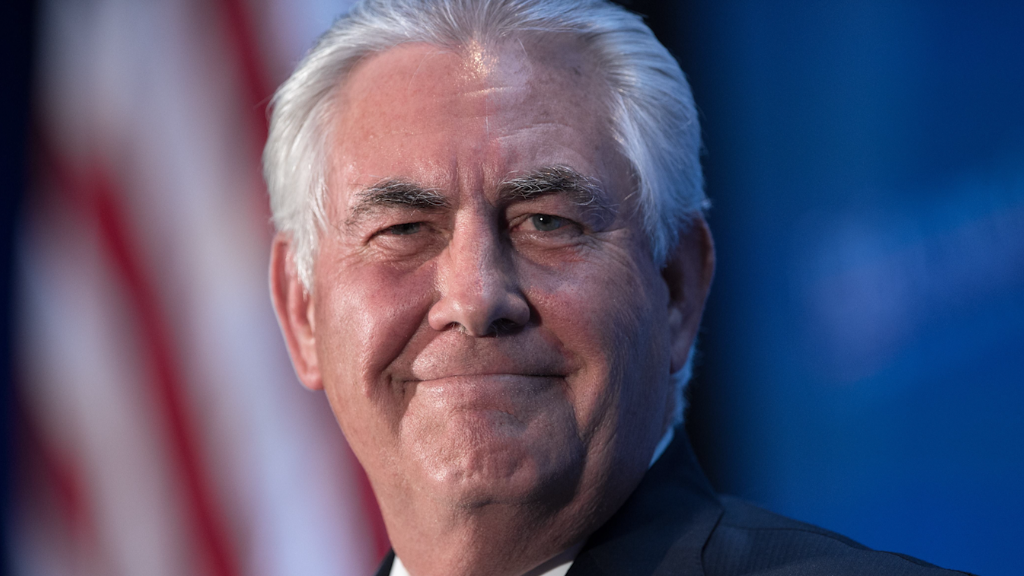
ExxonMobil may have a problem in Iraq.
The country is one of seven covered by President Trump's travel ban. And the company is the only American firm still operating under an oil license granted by the Iraqi government.
ExxonMobil's (XOM) presence in Iraq is the work of former CEO Rex Tillerson, now Trump's pick for U.S. secretary of state.
In 2009, many Iraqi oil fields were opened up for development following years of violence. The government was desperate to increase oil production and revive its war-torn economy.
Iraq sits on more than 143 billion barrels of reserves, the 5th biggest in the world, and Tillerson was quick to spot the opportunity.
ExxonMobil committed to a $50 billion joint venture to develop a giant field called West Qurna, located in the south of the country. The venture has been a success -- the Qurna field produced 377,000 barrels of oil per day in 2015, up by about 150,000 barrels since 2010, according to ExxonMobil.
Related: Rex Tillerson to put Exxon nest egg in a trust over conflict of interest concerns
But it hasn't all been plain sailing for ExxonMobil. Two years after the Qurna deal, the company found itself in hot water.
Tillerson made a controversial move, signing a deal to explore for oil in the semi-autonomous Kurdish region in northern Iraq.
The Iraqi government in Baghdad deems any deals with the Kurdish region illegal, and is in a long-running dispute over how to divide revenue from oil fields under Kurdish control.
The move was also in defiance of U.S. policy at the time. The New Yorker reported in December that Tillerson didn't ask for State Department permission, but called officials after the fact to say: "I had to do what was best for my shareholders."
"I think there were some raised eyebrows when ExonnMobil decided to go into northern Iraq but the reality is it is a company that had the capacity and skill to get involved in both of those type of developments," said John Roper, chairman of the Dubai Petroleum Club, a forum for regional energy executives.
In a bid to placate the Iraqi government, Tillerson agreed to reduce ExxonMobil's stake in Qurna to 25% from 60%.
Now, tensions are rising again, and not just over the ban on Iraqi citizens traveling to the U.S. for the next 90 days.
President Trump's unguarded remarks about Iraqi oil are also straining relations.
He has said the U.S. should have kept Iraq's oil after the invasion in 2003, and repeated that assertion in an interview last week.
During an appearance at the CIA this month, Trump said "maybe we'll have another chance" to keep the oil.
"Iraq's oil is constitutionally the property of the Iraqis and anything on the contrary is unacceptable," Iraq's Prime Minister Haider al-Abadi told reporters.
Related: The tech firms fighting Trump's travel ban with cash
The travel ban prompted the Iraqi parliament on Monday to demand that the government "act reciprocally with the United States."
If the government chooses to act, it could hurt American interests in Iraq, and ExxonMobil would be in the firing line.
Other American oil firms, including Chevron (CVX), are active in the Kurdish region, but Occidental Petroleum (OXY) sold its stake in a field in the south in 2015, leaving ExxonMobil as the only firm operating with Baghdad's permission.
ExxonMobil declined to comment on the travel ban and its impact on staff and operations in Iraq.
A spokesman for Chevron said he wasn't aware of any impact from the travel ban on its business in the Kurdish region.
"We are reviewing the executive order to understand any implications for our employees," he said.
-- John Defterios contributed to this report.


